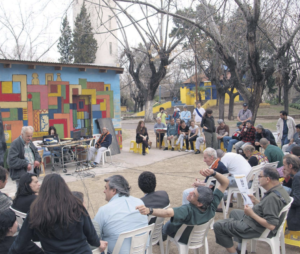The National (UAE), January 2 2012
A small radio station is giving a therapeutic voice to psychiatric patients near Buenos Aires, reports Ed Stocker.

La Colifata radio station, which celebrated 20 years on air last year, broadcasts directly from the hospital’s gardens every Saturday. And it’s the patients who set the agenda. Sitting in the shade of the trees with donated antenna and recording equipment, they discuss everything from philosophy to tango alongside members of the community as the show is streamed live over the internet and across the local FM network. Taking a break from the demanding job of running the radio, La Colifata’s director, Alfredo Olivera, and a former patient, Eduardo Codina, still involved with the station, chat to The National in one of the capital’s many leafy plazas. Entirely appropriately, we’ve decided to remain outside and talk in the warm sunshine.“La Colifata always helps me and when I urgently need to speak to someone I can always count on somebody from the station giving a helping hand,” says Codina, talking through his thick white beard. “On a human level, it helps me connect with people who before looked at me in a different, distrustful way. So it’s a way of forming a dialogue with this community, showing that we’re humans too and that we’re on the same path.”Codina still has mental health problems and prefers to touch only fleetingly on his difficult past, when he lived on the streets for 20 years with his mother, something that left scars he still bears. But there’s also no doubt that what he calls the “therapeutic radio station” has helped him leave hospital, earn a small salary selling CDs from the radio programmes and start to rebuild his life. Despite his problems, he’s an intelligent and eloquent interviewee.Olivera began La Colifata (the word is slang for “madness” but has a respectful, affectionate connotation) two decades ago after visiting the hospital as a volunteer and realising that “the patients who were living there didn’t have any connection with the outside world”. In that moment, the idea for a radio station was born. The original set-up was basic, logging the thoughts of the patients, recorded on a Dictaphone and edited into clips that were played on a community radio station.The recordings were a huge success, provoking a flurry of listener calls – the beginnings of La Colifata’s close interaction with local residents. Such was the positive reaction that Olivera decided to take the idea to Rock & Pop FM, a station that started to broadcast the segments. It was Rock & Pop that donated La Colifata’s first recording equipment, enabling it to broadcast directly from the hospital.Twenty years on, the station has retained its audience. “With technological advances, it’s not hard to make radio,” says Olivera. “But what is difficult is making sure that people want to listen. And not just listen, but contribute ideas. La Colifata creates these opportunities; it allows people to talk about ideas that are often silenced, dedramatising them without denying that they exist. And through this, it opens up new ways of communicating.”
Olivera claims that La Colifata is the first radio station in the world to use radio as a way to reintegrate patients back into the community and break down the barriers of prejudice and misunderstanding, which are especially high in Argentina, a country who has the highest percentage of its population in psychotherapy. The station has inspired similar projects around the world, including in Sweden, Mexico and Spain, and been visited by international musicians, including the Franco-Spanish globetrotter Manu Chao. He recorded a charity disc to raise funds for the station; entitled Viva La Colifata, it mixes patient conversations with his backing tracks.
Today, however, money is much less certain. In the past, 85 per cent of funding came from overseas charities, mostly in France and Spain, and through individual donations from Chao and the filmmaker Francis Ford Coppola. But for a year now, Olivera has been scraping by on minimal resources, despite a small grant from the Argentinian government of President Cristina Fernández de Kirchner.
“La Colifata is in danger of not being able to continue if it doesn’t find a regular and stable source of income,” laments Olivera. The fate of Borda Hospital is also in doubt, having been threatened with closure in 2008 and badly in need of investment to prop up its crumbling infrastructure. “Back in April, the hospital went three months without gas. Patients didn’t have access to hotwater showers or hot food, which had to come from other hospitals and was cold by the time it arrived.”
Unless the national government stumps up the funds, La Colifata’s days may be numbered. The loss to the world would be significant – and the future of people like Codina in danger. He says: “If it hadn’t been for the psychological help of the radio station, giving me the chance to say what I thought in front of a microphone, I don’t think I would have been able to move forward with my life.”